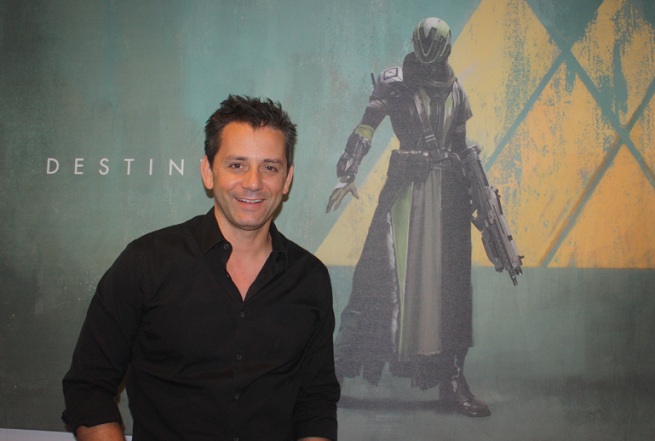Stay on top of all our E3 2013 coverage here.
LOS ANGELES — Activision Publishing moved all of its chips to the center of the table when it bet on Bungie’s Destiny, Skylanders, and Call of Duty. The division of Activision Blizzard showed off its lineup this week in a giant booth at the Electronic Entertainment Expo in Los Angeles.
Eric Hirshberg, the president and chief executive of Activision Publishing, is the one who pushed those chips forward. He is spending billions and making billions. His company should benefit from the huge investments that Sony and Microsoft are making in their next-generation game consoles.
He isn’t saying which in his favorite console: the PlayStation 4, the Xbox One, or the Nintendo Wii U. With his cross-platform games, Hirshberg is selling ammunition to all three in the console war. But he is willing to offer limited exclusives, and we probed into that in our interview with him at the Electronic Entertainment Expo.
Here’s an edited transcript of our interview.
GamesBeat: The console makers have spoken. Did they reveal anything that enables you to talk some more about any particular things that are relevant for these games? They do seem very different as far as where they stand on the sensors, with Kinect, and the controller.
Eric Hirshberg: Yeah, for sure. Has PlayStation even talked about the Move?
GamesBeat: No, it hasn’t. There was no mention of it.
Hirshberg: Is that just going to fade out?
GamesBeat: I haven’t had a chance to ask Sony about Move yet.
Hirshberg: It’s interesting. One of them is doubling down, and the other one is not.
GamesBeat: It sounds like the Move isn’t on your radar at the moment, then.
Hirshberg: [Pause] That’s a good deduction.
GamesBeat: On the Destiny demo, I couldn’t quite tell if the chatter was from the two guys on stage chattering as opposed to the chatter in the game.
Hirshberg: We were worried about that when we were putting that demo together. We thought we’d made it clear with [Bungie’s] Joe Staten’s introduction – this is Destiny, I’m a Guardian, and here comes [Bungie cofounder] Jason Jones, we’re going to meet up. Before they start bantering between one another, there was this setup that made it clear that this was their voices. But it’s interesting that you noticed that. Those were the voices of the players, not the onscreen characters.
The thing we were trying to get across in that demo was to bring to life this idea of a shared-world shooter. That was a single-player type of environment where you’re playing against artificial intelligence. That’s also the way that you go through the story in the game, how the plot unfolds before you. So it would be most highly related to single-player in the current lexicon. But here you are bumping into friends who are inhabiting the same world you are, and bumping into strangers who you have to team up with in order to take down a boss villain. That’s pretty fresh. That’s what we were trying to get across. That’s why we kept adding people who kept teaming up with one another.
Now, if you just want to play alone and have a single-player experience, you’re able to do that in Destiny as well. But this was one of the key innovations. It’s either a new genre or a very fresh take on an existing genre.
GamesBeat: It’s a little like what Ubisoft has been calling seamless multiplayer, where it has no break between the single-player and the multiplayer experience.
Hirshberg: Yes, but I would say that because you’re progressing through the world—it never turned into a multiplayer game. You never entered an arena and started competing against other players. You could team up or not team up and make that choice autonomously. But you’re all inhabiting the same world.
GamesBeat: I saw the public part of this pop up. Can it be as large or small as the developers want to make it?
Hirshberg: The space itself? Yeah. Those public spaces appear at the right cadence as well. There’s a lot of different types of gameplay that you’re going to encounter through an average play session in Destiny. The demo showed that. It showed Joe starting out as a lone player. He’s deciding to go outside the wall. He teams up with a friend. They get in and have a battle, just the two of them, and then they encounter the spider tank – a miniboss, if you will. There’s another strike team that’s hard at work trying to defeat it, and they team up so that the five of them are able to take it down. I feel like those public spaces are both novel and differentiating, but they need to come at the right pace, so you’re having different experiences. The demo definitely focused on the newness.
GamesBeat: Is there a narrated experience that you haven’t shown yet?
Hirshberg: Yeah. We’ve shown a bit of that in the trailer. It wasn’t a huge part of the demo. The story of Destiny, the mythology and the characters and the narrative, is a very important part of the game. It’s something Bungie historically has done very well: creating characters that you connect with and care about and worlds that seem to have their own set of authentic structure and rules that you connect with. I certainly felt that way about Halo.
GamesBeat: Could you explain your long-term relationship with Sony?
Hirshberg: There’s not much to explain. It’s a fairly straight-up-the-middle relationship, not unlike the relationship we’ve had between Call of Duty and Microsoft. It’s a way for us to amplify our launches and our branding and our marketing. It’s a way for us to give them some exclusives that are relevant to their audience as well.

